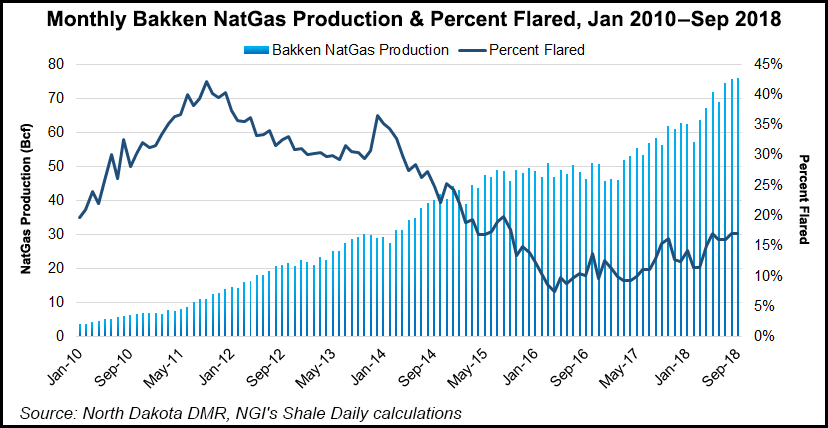Shale Daily | NGI All News Access | NGI The Weekly Gas Market Report | Regulatory
North Dakota’s Natural Gas Capture Rules Add Flexibility
The three-member North Dakota Industrial Commission (IC) on Tuesday approved amendments to the natural gas capture policy to streamline rights-of-way processes and encouraging more investment in value-added technologies.

Since 2014 when the IC established industry-endorsed gas capture goals, flared gas declined steadily but it has begun creeping up as crude oil production escalates and takeaway capacity is delayed.
Department of Minerals Resources Director Lynn Helms last month said flaring would be a continuous issue for the next couple of years.
The updated policy provides “flexibility for operators to manage their operations and gas capture plans within the gas capture goals established by the IC to better reflect present-day conditions, including infrastructure, well completion technology and more-productive wells,” an IC spokesperson said.
Gov. Doug Burgum chairs the IC with members Attorney General Wayne Stenehjem and Agriculture Commissioner Doug Goehring.
“It was time to revisit our policy, and the goal is to increase the volume of captured gas and reduce the percentage of flared gas, in addition to encouraging investment in gas capture infrastructure,” the IC stated. “This policy must also be balanced with what infrastructure is in place and how the industry is evolving.”
Under the amendments, up to six horizontal wells outside the Bakken Shale core may be designated as “stranded,” and would be allowed to produce at maximum efficient rates without counting the gas production for a 12-month period.
“This will allow valuable information to be obtained to make decisions regarding future well and infrastructure requirements,” according to the policy.
The state’s gas capture goals remain at 88% as of Nov. 1, however, they are to be evaluated by county and by field, and ultimately by each well for each operator. Under four different scenarios, an operator could remove calculated gas volumes under prescribed circumstances that have been documented in writing.
Flexibility also may be provided in the form of temporary exemptions from production restrictions for “extenuating circumstances” under the amended policy.
© 2024 Natural Gas Intelligence. All rights reserved.
ISSN © 2577-9877 | ISSN © 1532-1266 | ISSN © 2158-8023 |
